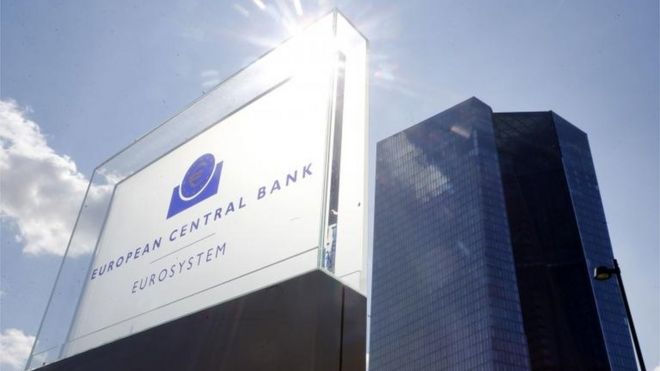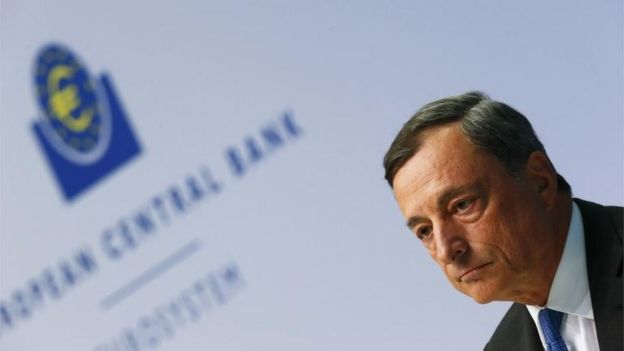The European Central Bank (ECB) has cut its inflation and growth forecasts for 2015 and the next two years.

It expects inflation in the eurozone to remain "very low" for some years as threats to economic growth increase.
ECB president Mario Draghi said Europe's economic recovery would continue, "albeit at a somewhat weaker pace than expected".
The euro fell sharply as Mr Draghi also hinted that the bank could expand its stimulus programme if necessary.
He was speaking after the ECB kept its main interest rate on hold at 0.05%.
The ECB is now forecasting economic growth in the eurozone of 1.4% in 2015, down from 1.5%, and 1.7% in 2016, compared with its previous projection of 1.9%.
However, Mr Draghi said that risks to the outlook for economic growth and inflation had worsened since mid-August, when the latest projections were calculated.
Euro falls
"Lower commodity prices, a stronger euro, somewhat lower growth, have increased the risk to a sustainable path of inflation towards 2%," he told a news conference in Frankfurt.
The euro fell sharply following Mr Draghi's comments, dropping a cent against the dollar to $1.1127.
He also admitted that inflation could turn negative in the coming months.
The bank expected inflation to be 0.1% for 2015, rising to 1.5% in 2016 and 1.7% in 2017, dampened by lower energy prices.
The ECB made no change to its bond-buying programme, but Mr Draghi said it could be extended beyond its planned conclusion in September 2016 if necessary.
Analysis: Andrew Walker, economics correspondent
What was the (not very) coded message in Mario Draghi's remarks? That the ECB's Governing Council is very uneasy that inflation remains too low and is not responding as quickly as hoped to the quantitative easing programme launched earlier this year.
It was also clear that the ECB was ready to strengthen the programme by running it for longer - it is planned to run until September next year - spending more each month on it, or by buying a wider range of assets.
It all depends on the economic data - essentially whether it looks like inflation is going to get back to the target of below or close to 2%. It remains way below that figure and is not getting closer, so more eurozone QE looks like a strong possibility.
Fears of negative inflation - also known as deflation - prompted the bank to start its quantitative easing programme in March.
The ECB has been buying €60bn of government bonds a month in a bid to increase inflation in key economies such as France and Germany.
However, eurozone inflation stood at just 0.2% in August - far below the 2% target.
Howard Archer, of IHS Global Insight, said: "The door is now clearly wide open to the ECB stepping up its near-term pace of quantitative easing and/or increasing its overall size and duration. Whether the ECB steps through that door will clearly depend on whether eurozone growth continues to struggle and inflation prospects deteriorate further."
 Reuters
Reuters
The central bank also kept the rate for bank overnight deposits on hold at minus 0.2%, which means banks must pay to hold funds at the central bank.
'Unspectacular' growth
Earlier on Thursday, a survey indicated that activity among eurozone businesses rose at the fastest pace for more than four years in August.
The composite purchasing managers' index (PMI) compiled by Markit rose to 54.3 last month, up from July's figure of 53.9. A figure above 50 indicates expansion.
Markit chief economist Chris Williamson said the PMI figures suggested that the eurozone's economy would grow by 0.4% in the third quarter of the year, which he called "a solid - albeit unspectacular - rate of expansion".
Eurostat said on Thursday that eurozone retail sales rose by 0.4% in July compared with June, roughly in line with expectations and considerably better than the 0.2% decline in June.
Consumer confidence appeared to be particularly strong in Germany, Europe's biggest economy, where retail sales jumped by 1.4% last month.
No comments:
Post a Comment